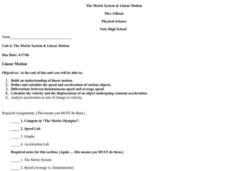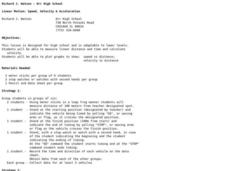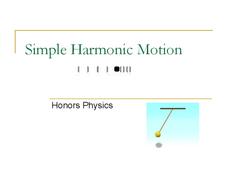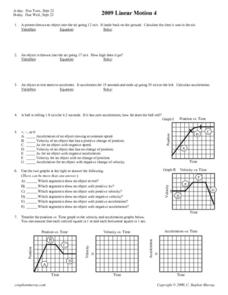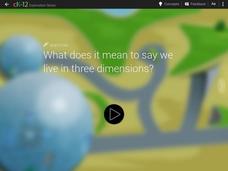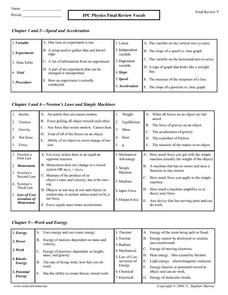Curated OER
Linear Motion
Students are able to build an understanding of linear motion. They are able to define and calculate the speed and acceleration of various objects. Students are able to differentiate betweeen instantaneous speed and average speed. They...
Curated OER
Linear Motion: Speed, Velocity & Acceleration
Students explore the concept of linear motion. In this linear motion lesson, students calculate distance and time in order to calculate average speed and velocity in the provided problems.
Curated OER
Harmonic Motion
In this harmonic motion worksheet, students read about the difference between harmonic motion and linear motion. They are given the parts of harmonic motion, graphs of harmonic motion and equations to find the period and frequency of...
Curated OER
Harmonic Motion
In this harmonic motion worksheet, students read about repetitive motion, the parts of harmonic motion, and graphing harmonic motion. Students then complete 5 matching and 20 fill in the blank questions.
Mr. E. Science
Motion
An informative presentation covers motion, metric system, conversions, graphing of coordinates and lines, speed, velocity, and acceleration problems, as well as mean calculations. This is the first lesson in a 26-part series.
Curated OER
Simple Harmonic Motion
Back and forth, and back again. A presentation on harmonic motion would make a great backdrop for a directed instruction lesson in Honors Physics. It includes diagrams, formulas, graphs, and a few sample problems.
Curated OER
Linear Motion 5
In this linear motion activity, students answer 9 questions about velocity, acceleration and position of objects. They solve problems for acceleration and velocity and they interpret graphs of velocity vs. time, acceleration vs. time and...
Curated OER
Linear Motion 4
For this linear motion worksheet, students answer 12 questions including finding acceleration of moving objects, calculating distance objects travel and determining the time of travel. Students interpret graphs of position vs. time,...
Curated OER
Linear Motion in Class Test Review
In this linear motion learning exercise, students answer 21 questions about acceleration, velocity, position and time. Students interpret graphs of position vs. time, velocity vs. time and acceleration vs. time. They calculate speed of...
Curated OER
Linear Motion 6
For this linear motion worksheet, learners answer 12 questions about acceleration, velocity and distance traveled. They interpret diagrams and indicate the location of an object if it has positive, negative or no acceleration. They...
Curated OER
Graphing Linear Motion
For this graphing linear motion worksheet, students answer 20 questions about velocity of objects, the distance they travel and the time. They interpret a graph of position vs. time and identify the velocity at certain point on the graph.
Curated OER
Linear Motion 3
In this linear motion worksheet, learners answer 11 questions including finding acceleration of moving objects, finding the distance objects travel and finding the time it takes objects to move a particular distance. Students interpret...
Curated OER
Linear Motion 2
In this linear motion worksheet, students answer 12 questions about displacement, velocity, and acceleration. They solve problems for acceleration, displacement and velocity and show the equations they used to find the solutions. They...
CK-12 Foundation
Irwin 2D
Learners explore two-dimensional motion through visual modeling with an interactive lesson that allows them to control the path of a robot. Graphs show both the horizontal and vertical motion as the robot continues through its...
Curated OER
Harmonic Motion and Light Review
In this harmonic motion and light worksheet, students review concepts such as identifying motion as harmonic, linear or wave motion, analyzing graphs of position vs. time and pendulum movement, answering questions about light and the...
Curated OER
Algebra-Based Linear Motion Problems
For this motion worksheet, learners determine the distance traveled, the acceleration, and velocity of different objects. This worksheet has 11 problems to solve.
Curated OER
Walking Home II
Students explore the relationship between distance and time. They analyze a situation involving distance traveled in a given period of time, represent the situation graphically and algebraically, and discuss the concept of slope as a...
Curated OER
Mathematical Techniques - Basic Graphing
Students are introduced to significant figures and how to add, subtract, multiply and divide them. In a group, they practice plotting data points from a table to a graph and labeling all axes. They calculate the slope and y-intercept and...
Curated OER
Waves
In this waves worksheet, students read about harmonic and linear motion in waves as well as the two types of waves. They match 5 terms to their definitions about the structure of waves, they solve for the wavelength, frequency and...
Chemistry Collective
Chemical Potential: Staircase Demonstration
It's all uphill from here! Scholars examine the pattern of random particle motion up a staircase. The simulation shows how the linear increase in energy corresponds to an exponential decrease in particle concentration.
Curated OER
IPC Physics Vocabulary Review
In this physics review worksheet, students review vocabulary words associated with speed, acceleration, Newton's Laws and simple machines, work and energy, magnetism, electricity, and harmonic motion and light. This worksheet has 92...
Curated OER
Height of Bounce
Eighth graders determine the relationship between the height of bounce of a ping-pong ball and the height from which it was dropped. They are assessed on the ability to record and interpret data, graph data, make predictions, and make...
Curated OER
Amusement Park Physics
Students get up close and personal with principles of motion. In this physics lesson, students collect and analyze acceleration data on amusement park rides. Students use CBLs to collect data in this lesson.
Curated OER
Activity One Teacher Page: Vehicles In Motion
Students identify variables that affect the system, and specify which variables are independent and which are dependent.
